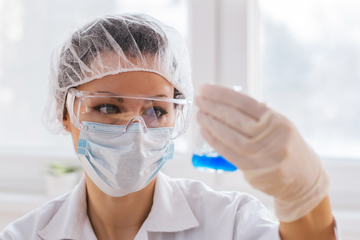Browse
Assessing Learning
Posted on: #iteachmsu

ASSESSING LEARNING
Tips to increase your hemoglobin levels
Here are some tips to keep in mind to increase your hemoglobin levels:
Switch to brown rice: As a superfood, brown rice can help prevent various diseases related to cholesterol and the gastrointestinal system. It is rich in iron, containing 0.52 milligrams of iron for every 100 grams.
Enjoy dark chocolate: With over 80% of cocoa, dark chocolate naturally improves hemoglobin levels. Plus, it is loaded with minerals, nutrients and antioxidants.
Drink nettle tea: The spice nettle has also proven to be a good source of iron and vitamin B and C. They can also play a part in increasing hemoglobin levels.
Exercise: Take up moderate to high-intensity exercise to help your body produce more hemoglobin to meet the oxygen demands of your body.
Stay tuned to the Activ Living Community. Keep up to date with the latest health tips and trends through expert videos, podcasts, articles, and much more in nutrition, fitness, mindfulness, and lifestyle conditions like Asthma, Blood Pressure, Cholesterol, and Diabetes.
Switch to brown rice: As a superfood, brown rice can help prevent various diseases related to cholesterol and the gastrointestinal system. It is rich in iron, containing 0.52 milligrams of iron for every 100 grams.
Enjoy dark chocolate: With over 80% of cocoa, dark chocolate naturally improves hemoglobin levels. Plus, it is loaded with minerals, nutrients and antioxidants.
Drink nettle tea: The spice nettle has also proven to be a good source of iron and vitamin B and C. They can also play a part in increasing hemoglobin levels.
Exercise: Take up moderate to high-intensity exercise to help your body produce more hemoglobin to meet the oxygen demands of your body.
Stay tuned to the Activ Living Community. Keep up to date with the latest health tips and trends through expert videos, podcasts, articles, and much more in nutrition, fitness, mindfulness, and lifestyle conditions like Asthma, Blood Pressure, Cholesterol, and Diabetes.
Authored by:
Vijaya

Posted on: #iteachmsu


Tips to increase your hemoglobin levels
Here are some tips to keep in mind to increase your hemoglobin leve...
Authored by:
ASSESSING LEARNING
Thursday, Sep 28, 2023
Posted on: #iteachmsu


Posted by
almost 2 years ago
Digital Collaborative Learning for the 21st Century 2.0 (Learning Community for AY2023-2024)
https://www.youtube.com/watch?v=nMxqEkg3wQ0
This talk was a given at a local TEDx event, produced independently of the TED Conferences. Peter is a school principal with a radical solution, no school bell...
This talk was given at a local TEDx event, produced independently of the TED Conferences. Peter is a school principal with a radical solution, no school bell, no school levels, staff selection and curriculum is even decided by students. Result? No bullying, collaboration, innovation in school dynamics. Peter Hutton hated his own school experience, where he felt that education was being done “to him”. As Principal of Templestowe College he developed an educational model that allows students to individualize their education and share control in the running of the school. About TEDx, x = independently organized event In the spirit of ideas worth spreading, TEDx is a program of local, self-organized events that bring people together to share a TED-like experience. At a TEDx event, TEDTalks video and live speakers combine to spark deep discussion and connection in a small group. These local, self-organized events are branded TEDx, where x = independently organized TED event. The TED Conference provides general guidance for the TEDx program, but individual TEDx events are self-organized.* (*Subject to certain rules and regulations)
https://www.youtube.com/watch?v=nMxqEkg3wQ0
This talk was a given at a local TEDx event, produced independently of the TED Conferences. Peter is a school principal with a radical solution, no school bell...
This talk was given at a local TEDx event, produced independently of the TED Conferences. Peter is a school principal with a radical solution, no school bell, no school levels, staff selection and curriculum is even decided by students. Result? No bullying, collaboration, innovation in school dynamics. Peter Hutton hated his own school experience, where he felt that education was being done “to him”. As Principal of Templestowe College he developed an educational model that allows students to individualize their education and share control in the running of the school. About TEDx, x = independently organized event In the spirit of ideas worth spreading, TEDx is a program of local, self-organized events that bring people together to share a TED-like experience. At a TEDx event, TEDTalks video and live speakers combine to spark deep discussion and connection in a small group. These local, self-organized events are branded TEDx, where x = independently organized TED event. The TED Conference provides general guidance for the TEDx program, but individual TEDx events are self-organized.* (*Subject to certain rules and regulations)
Assessing Learning
Posted on: Group 2

Assessing Learning
Eastern Education
Authored by:
Rohit 936
Posted on: Group 2

ASSESSING LEARNING
Western education
Education is the transmission of knowledge, skills, and character traits. There are many debates about its precise definition, for example, about which aims it tries to achieve. A further issue is whether part of the meaning of education is that the change in the student is an improvement. Some researchers stress the role of critical thinking to distinguish education from indoctrination. These disagreements affect how to identify, measure, and improve forms of education. The term can also refer to the mental states and qualities of educated people. Additionally, it can mean the academic field studying education.
Posted by:
Miller brother
Posted on: Group 2

Western education
Education is the transmission of knowledge, skills, ...
Posted by:
ASSESSING LEARNING
Wednesday, Sep 20, 2023
Posted on: #iteachmsu

ASSESSING LEARNING
Special characters
Parameter Patient Reference Range Units Haemoglobin Adult Male 130 - 180 g/L Adult Female 115 - 165 g/L Red Cell Count Adult Male 4.50 - 6.50 x10^12/L Adult Female 3.80 - 5.80 x10^12/L Haematocrit Adult Male 0.40 - 0.54 L/L Adult Female 0.37 - 0.47 L/L Mean Cell Volume Adult 80 - 100 fL Mean Cell Haemoglobin Adult 27 - 32 pg White Cell Count Adult 3.6 - 11.0 x10^9/L Neutrophils Adult 1.8 - 7.5 x10^9/L Lymphocytes Adult 1.0 - 4.0 x10^9/L Monocytes Adult 0.2 - 0.8 x10^9/L Eosinophils Adult 0.1 - 0.4 x10^9/L Basophils Adult 0.02 - 0.10 x10^9/L Platelet Count Adult 140 - 400 x10^9/L
Posted by:
Super Admin
Posted on: #iteachmsu

Special characters
Parameter Patient Reference Range Units Haemoglobin Adult Male ...
Posted by:
ASSESSING LEARNING
Friday, Sep 8, 2023
Posted on: #iteachmsu

ASSESSING LEARNING
Department of Haematology
Department of Haematology
Notes
Full blood counts are performed on automated equipment and provide haemoglobin concentration, red cell indices, white cell count (with a differential count) and platelet count.
The presence of abnormal white cell and red cell morphology is flagged by the analysers.
Blood films may be inspected to confirm and interpret abnormalities identified by the cell counter, or to look for certain specific haematological abnormalities.
Grossly abnormal FBC results and abnormal blood films will be phoned through to the requestor.
There is no need to request a blood film to obtain a differential white count. It is, however, important that clinical details are provided to allow the laboratory to decide whether a blood film, in addition to the automated analysis, is required.
Under some circumstances a differential is not routinely performed, e.g. pre-op, post-op, antenatal and postnatal requests.
Full Blood Counts are performed at CGH and GRH
See also: Reticulocyte Count
The FBC comprises the following tests
Standard
Haemoglobin (Hb)
White Blood Count (WBC)
Platelet Count (Plt)
Red Cell Count (RBC)
Haematocrit (HCT)
Mean Cell Volume - Red cell (MCV)
Mean Cell Haemoglobin (MCH)
Differential White Cell Count (where applicable)
Neutrophils
Lymphocytes
Monocytes
Eosinophils
Basophils
And if appropriate
Blood Film
Sample Requirements
2ml or 4ml EDTA sample or a Paediatric 1ml EDTA sample.
Sample Storage and Retention
Pre analysis storage: do not store, send to laboratory within 4 hours.
Sample retention by lab: EDTA samples are retained for a minimum of 48 hours at 2-10°C
Transport of samples may affect sample viability, i.e. FBC results will degenerate if exposed to high temperatures, such as prolonged transportation in a hot car in summer.
This test can be added on to a previous request as long as there is sufficient sample remaining and the sample is less than 24 hours old.
Turnaround Times
Clinical emergency: 30 mins
Other urgent sample: 60 mins
Routine: within 2 hours
Reference Ranges
If references ranges are required for paediatric patients please contact the laboratory for these.
Parameter Patient Reference Range Units Haemoglobin Adult Male 130 - 180 g/L Adult Female 115 - 165 g/L Red Cell Count Adult Male 4.50 - 6.50 x10^12/L Adult Female 3.80 - 5.80 x10^12/L Haematocrit Adult Male 0.40 - 0.54 L/L Adult Female 0.37 - 0.47 L/L Mean Cell Volume Adult 80 - 100 fL Mean Cell Haemoglobin Adult 27 - 32 pg White Cell Count Adult 3.6 - 11.0 x10^9/L Neutrophils Adult 1.8 - 7.5 x10^9/L Lymphocytes Adult 1.0 - 4.0 x10^9/L Monocytes Adult 0.2 - 0.8 x10^9/L Eosinophils Adult 0.1 - 0.4 x10^9/L Basophils Adult 0.02 - 0.10 x10^9/L Platelet Count Adult 140 - 400 x10^9/L
Notes
Full blood counts are performed on automated equipment and provide haemoglobin concentration, red cell indices, white cell count (with a differential count) and platelet count.
The presence of abnormal white cell and red cell morphology is flagged by the analysers.
Blood films may be inspected to confirm and interpret abnormalities identified by the cell counter, or to look for certain specific haematological abnormalities.
Grossly abnormal FBC results and abnormal blood films will be phoned through to the requestor.
There is no need to request a blood film to obtain a differential white count. It is, however, important that clinical details are provided to allow the laboratory to decide whether a blood film, in addition to the automated analysis, is required.
Under some circumstances a differential is not routinely performed, e.g. pre-op, post-op, antenatal and postnatal requests.
Full Blood Counts are performed at CGH and GRH
See also: Reticulocyte Count
The FBC comprises the following tests
Standard
Haemoglobin (Hb)
White Blood Count (WBC)
Platelet Count (Plt)
Red Cell Count (RBC)
Haematocrit (HCT)
Mean Cell Volume - Red cell (MCV)
Mean Cell Haemoglobin (MCH)
Differential White Cell Count (where applicable)
Neutrophils
Lymphocytes
Monocytes
Eosinophils
Basophils
And if appropriate
Blood Film
Sample Requirements
2ml or 4ml EDTA sample or a Paediatric 1ml EDTA sample.
Sample Storage and Retention
Pre analysis storage: do not store, send to laboratory within 4 hours.
Sample retention by lab: EDTA samples are retained for a minimum of 48 hours at 2-10°C
Transport of samples may affect sample viability, i.e. FBC results will degenerate if exposed to high temperatures, such as prolonged transportation in a hot car in summer.
This test can be added on to a previous request as long as there is sufficient sample remaining and the sample is less than 24 hours old.
Turnaround Times
Clinical emergency: 30 mins
Other urgent sample: 60 mins
Routine: within 2 hours
Reference Ranges
If references ranges are required for paediatric patients please contact the laboratory for these.
Parameter Patient Reference Range Units Haemoglobin Adult Male 130 - 180 g/L Adult Female 115 - 165 g/L Red Cell Count Adult Male 4.50 - 6.50 x10^12/L Adult Female 3.80 - 5.80 x10^12/L Haematocrit Adult Male 0.40 - 0.54 L/L Adult Female 0.37 - 0.47 L/L Mean Cell Volume Adult 80 - 100 fL Mean Cell Haemoglobin Adult 27 - 32 pg White Cell Count Adult 3.6 - 11.0 x10^9/L Neutrophils Adult 1.8 - 7.5 x10^9/L Lymphocytes Adult 1.0 - 4.0 x10^9/L Monocytes Adult 0.2 - 0.8 x10^9/L Eosinophils Adult 0.1 - 0.4 x10^9/L Basophils Adult 0.02 - 0.10 x10^9/L Platelet Count Adult 140 - 400 x10^9/L
Posted by:
Super Admin
Posted on: #iteachmsu

Department of Haematology
Department of Haematology
Notes
Full blood counts are performed on...
Notes
Full blood counts are performed on...
Posted by:
ASSESSING LEARNING
Friday, Sep 8, 2023
Posted on: #iteachmsu

Assessing Learning
FBC
Authored by:
Super admin - R

Posted on: #iteachmsu

Assessing Learning
FBC
Authored by:
Super admin - R


